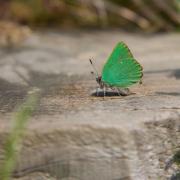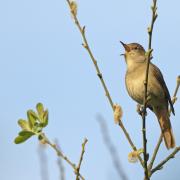Gloucestershire-based musician Steven Sproat can do remarkable things with a ukulele, as Candia McKormack discovers
I’m at home, preparing to meet with probably our country’s finest living ukulele player when I stumble across an interview he did with former boy soprano and current broadcaster Aled Jones on BBC Radio 2. After Steven plays his rendition of Gilbert O’Sullivan’s Alone Again (Naturally), Aled says “no disrespect to anyone who’s performed live on my show in the six or so years I’ve been doing it, but that’s been my favourite… what a tonic you are.”
Praise indeed. But I think this goes some way in showing just what a presence Steven has, and the pure magic he can weave with this unassuming four-stringed instrument. And there’s no denying the instant rapport felt between the two men.
“I was once mistaken for Aled Jones,” he laughs, “and I told him so. I was up in the Lake District in a coffee shop and this lady came up and said, ‘I know who you are, you’re Aled Jones, aren’t you?’ When I told Aled he said ‘Oh, you poor thing!’
“He’s such a lovely guy,” he smiles. “When it’s live, national radio, eight o’clock in the morning and your voice isn’t brilliant, you can get a bit nervous, but he really put me at ease.”
And putting people at ease is what Steven’s exceptionally good at, too. When I visit him in his lovely country cottage in the Forest of Dean – those views! – he gives me the warmest of welcomes, with a plate of chocolate biscuits, mug of coffee and warm hug. The thing is, he’s been at the top of his game for some time now, is loved and well respected by audiences and other musicians, and has come into contact with some of our best-known personalities, breaking down the mystique of mastering the ukulele. But he really is oh-so modest about it all, that it takes some encouragement to tease the names out of him…
“I taught Frank Skinner the banjo uke for a while…”
… and Harry Hill, too, I prompt.
“Oh, yes, Harry Hill was the man who really kicked it all off. I’ve been involved with music a long, long time, but when you suddenly get a message on your answerphone from Harry Hill wanting lessons you think, ah, I might be turning a bit of a corner here.
“It was about ten years ago; I’d been on holiday and came back to a message saying…” – and Steven goes from dulcet Durham tones to a very good impression of the comedian – “’Hello, it’s Harry Hill here, I’d like some lessons from you…’ And I thought, why would someone leave their name if you didn’t know them; he said Harry Hill but it can’t be the Harry Hill.”
As it was late in the evening, Steven called him the next morning and tentatively enquired as to whether it was the man himself. Harry and Steven got on famously, and it was he that persuaded Steven to publish his books on learning to play the ukulele.
“He said to me, ‘Look, why don’t I come with you to the publisher’.” Which is exactly what he did. As a result of the meeting, Steven signed a publishing deal with the UK’s biggest music publishing company, Wise Publications.
His first book, Starting Ukulele, features daughter Gabrielle – then just nine years old – holding the ukulele and showing techniques. Now 19 and living in Cheltenham, she has become a very talented musician in her own right and appears on her dad’s new album, Fruit for the Soul, singing backing vocals. There’s a lovely video on YouTube of father and daughter performing on stage in New York which is well worth checking out.
His book Absolute Beginners Ukulele – an omnibus collection described as ‘the complete absolute beginners method – all in one book!’ is a huge bestseller. When it was written 10 years ago, the ukulele was enjoying some success as an instrument in its own right, but since then has gone on to become something of a pint-sized rock ‘n’ roll star. From 20-quid Sponge Bob Squarepants numbers to beautifully inlaid, gorgeously toned koa and mahogany wood versions, there’s a uke to suit everyone. And, yes, just about anyone can get a tune of sorts out of one almost immediately so you begin to see its mass appeal.
“It’s gone from ‘George Formby’ style to being a guitarist’s second choice of instrument. The union flag and brightlycoloured styles have given them mass appeal, but you do tend to get what you pay for,” he acknowledges. “On saying that, though, I came across a guy in Cheltenham who had one that only cost him about ten Steven Sproat quid – it was bright yellow but sounded like a Martin [one of the top quality makes when it comes to acoustic instruments].”
Steven shows me a selection of ukuleles he has in his collection, starting with a beautifully petite traditional Hawaiian one made from koa wood. “Tom Courtenay, the actor, gave me that,” he says nonchalantly. I’m not letting him get away with that off-hand remark, though. I mean… seriously? It turns out that this beautifully diminutive instrument is very special and worth around £500.
“Well, there’s a nice link between Harry Hill and Tom Courtenay, actually,” he explains. “Tom Courtenay rang me up and said ‘My wife’s just bought me your book and I read in there that you taught Harry Hill’.” It turns out that Sir Tom and Harry Hill had been pen pals for a while but had never actually met, so Steven – in typically generous spirit – offered to hook them up. These two great talents were apparently huge fans of each other’s work, and it took a ukulele player from the Forest of Dean to get them together. In fact, there was even an interview in Time Out magazine where Tom Courtenay said that he ‘met Harry Hill as they had the same ukulele teacher’. Marvellous.
If you want proof of the bizarrely pleasing union of Sir Tom Courtenay and Harry Hill, visit YouTube where you can see a clip of them playing at the Half Moon, Putney, together. Uke gold. And while you’re there, check out Steven Sproat on the ‘Frank Skinner on Formby’ programme where Frank describes Formby’s playing as ‘watching a Rottweiler on a postman’. Take a listen, and you’ll see what he means.
George Formby, for all his saucy asides, was actually an astonishing banjo uke player (the banjo uke being a much louder version of the instrument, based on a circular drum-skin instead of a scaleddown guitar shape). While we’re all busy listening to the typical Formby doubleentendres about window-cleaning and little sticks of Blackpool rock, tittering away, we seem to overlook the appreciation for sheer musicianship that a more serious performer might enjoy.
And while we’re on the subject of underestimation, there are not many musicians who can say that they have their own ‘signature’ model that’s been designed and produced for them, but Steven is one such. “They produced a soprano signature model, and as a ‘thank you’ they said we’d like to make me one and so, well, they put my name in there…” he says modestly.
Steven’s love of the uke originally comes from his father. Although not a musician himself, he was a huge fan of Formby and would play his records constantly at home, and then tape cassettes on long car journeys.
“When we used to go on holiday in the car from Durham in the north east right down to Bournemouth in the south, he’d insist on playing these George Formby cassettes all the way down and all the way back again,” he laughs. As is often the way when you’re exposed to constant aural bombardment, you either declare you’ll never listen to it again or you become a convert… and you know of course what happened to young Steven.
When his father bought him his first uke, he struggled for years to master it as there weren’t that many teachers back then in the 1970s, and so he found his own way, in the form of the George Formby Society in Blackpool.
“Three times a year, bless him, my dad would take me on the two-hour journey from Durham to Blackpool,” he said. “He’d also take me along to working men’s clubs where they had… it wasn’t called open-mic nights then, but ‘go as you please’. Very old-fashioned.”
In those anarchistic days of Punk rock Steven was going out with dyed hair and PVC trousers, playing George Formby songs, and must have made quite an impression on the Northern working men’s clubs at that time.
“I had this dichotomy where I was massively influenced by George Formby, who was from the 1930s/40s era, but also had my other two heroes, David Bowie and Gilbert O’Sullivan.”
Steven’s commitment to his craft and his unwavering love for his instrument has certainly paid dividends, though. He’s gone on to tour across the world, including supporting Jules Holland, and has released four albums, the latest being Fruit for the Soul which is out later this month.
“Yeah, the ukulele’s been quite good to me, really,” he smiles as only a truly contented man can.
Steven’s new album Fruit for the Soul, recorded at ffg studios in Bredon, is released this month and is available from www.stevensproat.co.uk
Steven Sproat will preview his new album of guitar based songs Fruit for the Soul in the Studio Theatre at The Everyman, on Wednesday 16 March at 8pm



























